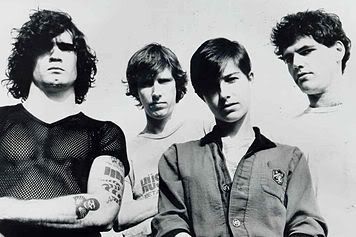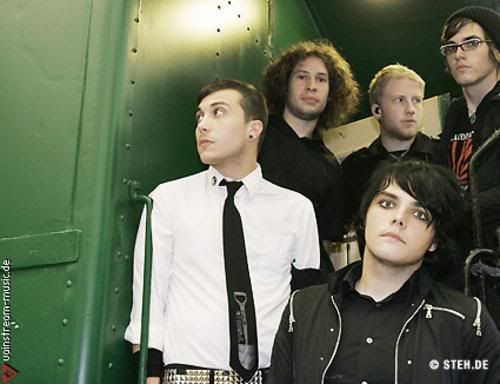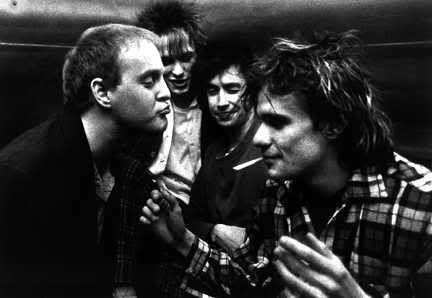
Members: Kurt Cobain (vocals, guitar), Krist Novoselic (bass), Chad Channing (drums, 1988-90), Jason Everman (guitar, 1989), Dave Grohl (drums, 1990-94), Pat Smear (guitar, 1993-94)
LP's: Bleach (1989), Nevermind (1991), In Utero (1993)
EP's: Blew (1989), Hormoaning (1991)
Live: MTV Unplugged In New York (1994), From The Muddy Banks Of The Wishkah (1996)
Other: Incesticide (1992)
Prior to Nirvana, alternative music was consigned to specialty sections of record stores and major labels considered it to be, at the very most, a tax write-off. After the band's second album, 1991's Nevermind, nothing was ever quite the same, for better and for worse. Nirvana popularized punk, post-punk, and indie rock, unintentionally bringing it into the American mainstream like no other band before it. While its sound was equal parts Black Sabbath (as learned by fellow Washington underground rockers the Melvins) and Cheap Trick, Nirvana's aesthetics were strictly indie rock. They covered Vaselines's songs, they revived new wave cuts by Devo, and leader Kurt Cobain relentlessly pushed his favorite bands — whether it was the art punk of the Raincoats or the country-fried hardcore of the Meat Puppets — as if his favorite records were always more important than his own music. While Nirvana's ideology was indie rock and melodies were pop, the sonic rush of their records and live shows merged the post-industrial white noise with heavy metal grind. And that's what made the group an unprecedented multi-platinum sensation. Jane's Addiction and Soundgarden may have proven to the vast American heavy metal audience that alternative could rock, and the Pixies may have merged pop sensibilities with indie rock white noise, but Nirvana pulled at all together, creating a sound that was both fiery and melodic. Since Nirvana was rooted in the indie aesthetic, but loved pop music, they fought their stardom while courting it, becoming some of the most notorious anti-rock stars in history. The result was a conscious attempt to shed their audience with the abrasive In Utero, which only partially fulfilled the band's goal. But by that point, the fate of the band and Kurt Cobain had been sealed. Suffering from drug addiction and manic depression, Cobain had become destructive and suicidal, though his management and label were able to hide the extent of his problems from the public until April 8, 1994, when he was found dead of a self-inflicted shotgun wound. Cobain may not have been able to weather Nirvana's success, but the band's legacy stands as one of the most influential in rock & roll history.
Kurt Cobain (vocals, guitar) met Chris Novoselic (born Krist Novoselic) (bass) in 1985 in Aberdeen, WA, a small logging town 100 miles away from Seattle. While Novoselic came from a relatively stable background, Cobain's childhood had been thrown into turmoil when his parents divorced when he was eight. Following the divorce, he lived at the homes of various relatives, developing a love for the Beatles and then heavy metal in the process. Eventually, American hardcore punk worked its way into dominating his listening habits and he met the Melvins, an Olympia-based underground heavy punk band. Cobain began playing in punk bands like Fecal Matter, often with the Melvins' bassist Dale Crover. Through the Melvins' leader Buzz Osborne, Cobain met Novoselic, who also had an intense interest in punk, which meant that he, like Cobain, felt alienated from the macho, redneck population of Aberdeen. The duo decided to form a band called the Stiff Woodies, with Cobain on drums, Novoselic on bass, and a rotating cast of guitarists and vocalists. The group went through name changes as quickly as guitarists, before deciding that Cobain would play guitar and sing. Renamed Skid Row, the new trio featured drummer Aaron Burkhart, who left the band by the end of 1986 and was replaced by Chad Channing. By 1987, the band was called Nirvana.
Nirvana began playing parties in Olympia, gaining a cult following. During 1987, the band made ten demos with producer Jack Endino, who played the recordings to Jonathan Poneman, one of the founders of the Seattle-based indie label Sub Pop. Poneman signed Nirvana, and in December of 1988, the band released their first single, a cover of Shocking Blue's "Love Buzz." Sub Pop orchestrated an effective marketing scheme, which painted the band as backwoods, logging-town hicks, which irritated Cobain and Novoselic. While "Love Buzz" was fairly well-received, the band's debut album, Bleach, was what began the ball rolling. Recorded for just over 600 dollars and released in the spring of 1989, Bleach slowly became a hit on college radio, due to the group's consistent touring. Though Jason Everman was credited as a second guitarist on the sleeve of Bleach, he didn't appear on the record; he only toured in support of the album before leaving the band at the end of the year to join Soundgarden and then Mindfunk. Bleach sold 35,000 copies and Nirvana became favorites of college radio, the British weekly music press, and Sonic Youth, Mudhoney, and Dinosaur Jr., which was enough to attract the attention of major labels.
During the summer, Nirvana released "Sliver"/"Dive," which was recorded with Mudhoney's Dan Peters on drums and produced by Butch Vig. The band also made a six-song demo with Vig, which was shopped to major labels, who soon began competing to sign the group. By the end of the summer, Dave Grohl, formerly of the D.C.-based hardcore band Scream, had become Nirvana's drummer and the band signed with DGC for $287,000. Nirvana recorded their second album with Vig, completing the record in the summer. Following a European tour supporting Sonic Youth in the late summer, Nevermind was released in September, supported by a quick American tour. While DGC was expecting a moderately successful release, in the neighborhood of 100,000 copies, Nevermind immediately became a smash hit, quickly selling out its initial shipment of 50,000 copies and creating a shortage across America. What helped the record become a success was "Smells Like Teen Spirit," a blistering four-chord rocker that was accompanied by a video that shot into heavy MTV rotation. By the beginning of 1992, "Smells Like Teen Spirit" had climbed into the American Top Ten and Nevermind bumped Michael Jackson's much-touted comeback album Dangerous off the top of the album charts; it reached the British Top Ten shortly afterward. By February, the album had been certified triple platinum.
Nirvana's success took the music industry by surprise, Nirvana included. It soon become apparent that the band wasn't quite sure how to handle their success. Around the time of Nevermind's release, the band was into baiting their audience — Cobain appeared on MTV's Headbanger's Ball in drag, the group mocked the tradition of miming on the BBC's Top of the Pops by Novoselic constantly throwing his bass into the air and Cobain singing his live vocals in the style of Ian Curtis, and their traditional live destruction of instruments was immortalized on a Saturday Night Live performance that ended with Novoselic and Grohl sharing a kiss — but by the spring, questions had begun to arise about the band's stability. Cobain married Courtney Love, the leader of the indie rock/foxcore band Hole, in February of 1992, announcing that the couple was expecting a child in the fall. Shortly after the marriage, rumors that the couple were heavy heroin users began to circulate and the strength of the rumors only increased when Nirvana canceled several summer concerts and refused to mount a full-scale American tour during the summer. Cobain complained that he was suffering from chronic stomach troubles, which seemed to be confirmed when he was admitted to a Belfast hospital after a June concert. But, heroin rumors continued to surface, especially in the form of a late-summer Vanity Fair article which implied that Love was using during her pregnancy. Both Love and Cobain denied the article's allegations, and publicly harassed and threatened the article's author. Love delivered Frances Bean Cobain, a healthy baby girl, on August 18, 1992, but the couple soon battled with Los Angeles' children's services, who claimed they were unfit parents on the basis of the Vanity Fair article. The couple was granted custody of their child by the beginning of 1993.
Since Cobain was going through such well-documented personal problems, Nirvana was unable to record a follow-up to Nevermind until the spring of 1993. In the meantime, DGC released the odds-and-ends compilation Incesticide late in 1992; the album reached number 39 in the U.S. and number 14 U.K. As the group prepared to make their third album, they released "Oh, the Guilt" as a split-single with the Jesus Lizard on Touch & Go Records. Choosing Steve Albini (Pixies, the Breeders, Big Black, the Jesus Lizard) as their producer, Nirvana recorded their third album, In Utero, in two weeks during the spring of 1993. Following its completion, controversy began to surround Nirvana again. Cobain suffered a heroin overdose on May 2, but the event was hidden from the press. The following month, Love called police to their Seattle home after Cobain locked himself in the bathroom, threatening suicide. Prior to debuting In Utero material during the New Music Seminar at New York's Roseland Ballroom in July, Cobain had another covered-up overdose. By that time, reports began to circulate, including an article in Newsweek, that DGC was unhappy with the forthcoming album, accusing that the band deliberately made an uncommercial record. Both the band and the label denied such allegations. Deciding that Albini's production was too flat, Nirvana decided to remaster the album with R.E.M.'s producer, Scott Litt.
In Utero was released in September of 1993 to positive reviews and strong initial sales, debuting at the top of the U.S. and U.K. charts. Nirvana supported it with a fall American tour, hiring former Germs member Pat Smear as an auxiliary guitarist. While the album and the tour were both successful, sales weren't quite as strong as expected, with several shows not selling out until the week of the concert. As a result, the group agreed to play MTV's acoustic Unplugged show at the end of the year, and sales of In Utero picked up after its December airing. After wrapping up the U.S. tour on January 8, 1994, with a show at Center Arena in Seattle, Nirvana embarked on a European tour in February. Following a concert in Munich on February 29, Cobain stayed in Rome to vacation with Love. On March 4, she awakened to find that Cobain had attempted suicide by overdosing on the tranquilizer Rohypnol and drinking champagne. While the attempt was initially reported as an accidental overdose, it was known within the Nirvana camp that the vocalist had left behind a suicide note.
Cobain returned to Seattle within a week of his hospitalization and his mental illness began to grow. On March 18, the police had to again talk the singer out of suicide after he locked himself in a room threatening to kill himself. Love and Nirvana's management organized an intervention program that resulted in Cobain's admission to the Exodus Recovery Center in L.A. on March 30, but he escaped from the clinic on April 1, returning to Seattle. His mother filed a missing persons report on April 4. The following day, Cobain shot himself in the head at his Seattle home. His body wasn't discovered until April 8, when an electrician contracted to install an alarm system at the Cobain house stumbled upon the body. After his death, Kurt Cobain was quickly anointed as a spokesman for Generation X, as well as a symbol of its tortured angst.
Novoselic and Grohl planned to release a double-disc live album at the end of 1994, but sorting through the tapes proved to be too painful, so MTV Unplugged in New York appeared in its place. The album debuted at the top of the British and American charts, as a home video comprised of live performances and interviews from the band's Nevermind-era, titled Live! Tonight! Sold Out!, was issued at the same time (the project began prior to Cobain's passing and was completed by surviving bandmembers).
In 1996, its electric counterpart, From the Muddy Banks of the Wishkah, was released, debuting at the top of the U.S. charts. Following Cobain's death, Grohl formed the Foo Fighters (early rumors that Novoselic would also be a member of the band ultimately proved to be false) — releasing their self-titled debut album in 1995, followed by The Colour and the Shape in 1997 and There Is Nothing Left to Lose in 1999. Novoselic formed the trio Sweet 75, releasing their debut in the spring of 1997, and also appeared along with former Dead Kennedys' frontman Jello Biafra and former Soundgarden guitarist Kim Thayil on the 2000 live set Live From the Battle in Seattle under the name the No W.T.O. Combo.
By the late '90s, research began by Novoselic for a proposed box set of previously unreleased songs from throughout Nirvana's career. The project was supposed to surface in the fall of 2001 (to coincide with the tenth anniversary release of Nevermind), but legal problems began to surface. In 1997, Grohl and Novoselic formed the Nirvana L.L.C. partnership with Courtney Love (who manages Cobain's estate) — a company that required a unanimous vote by all three regarding future albums, photos, and anything else Nirvana-related. When all three couldn't agree on the songs to be included on the box set, the matter was taken to court as Love attempted to dissolve the partnership. The project was ultimately shelved indefinitely as any legal decision was tied up in court.
Download: Nevermind
http://massmirror.com/9a1ca256c14fdbd022c7c415560d5453.html


